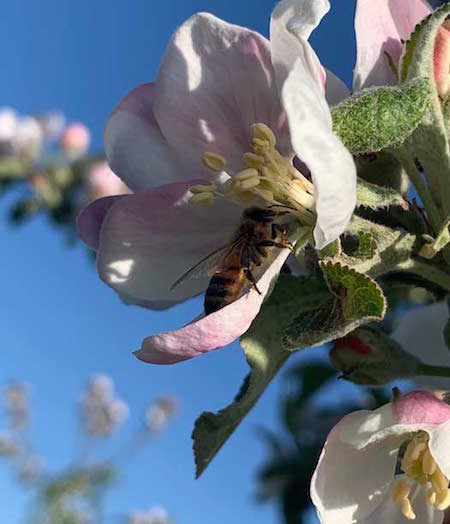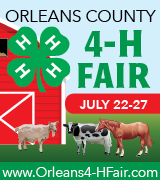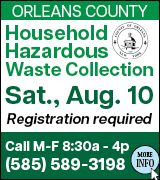State takes new actions to benefit and protect honeybees
Press Release, NYS Department of Agriculture and Markets

File photo: A bee pollinates a flower in an apple orchard in May 2020 in Knowlesville.
ALBANY – The New York State Departments of Agriculture and Markets (AGM) and Environmental Conservation (DEC) announced new actions to better protect pollinators and support the health of honeybees across New York State.
Signed by Governor Cuomo on June 26, this modernization of the Agriculture and Markets Law (AML) better reflects today’s bee husbandry practices and creates a Cooperative Honeybee Health Improvement Program to better monitor honeybee health in apiaries in New York.
“New York State is dedicated to maintaining the health of our pollinators, and this amendment to our Agriculture and Markets Law is another great step in the right direction,” said Ag Commissioner Richard A. Ball. “Thanks to the AML updates, we can build upon our Pollinator Protection Plan to continue to modernize our honeybee health programs and ensure the future of agriculture and our environment.”
DEC Commissioner Basil Seggos said, “The health of New York’s pollinators is directly tied to the health of our natural resources and agricultural economy. New York State is committed to maintaining healthy pollinator populations and we encourage all New Yorkers to join us in protecting pollinators by reducing the use of pesticides and herbicides that could be harmful to these creatures and creating good pollinator habitats in their own backyards, bolstering the ongoing efforts of the State’s Pollinator Protection Plan.”
The update to Article 15 of the AML:
- provides for the Apiary Industry Advisory Committee and designates the Commissioner of Agriculture as the chairperson of the committee;
- establishes a cooperative honeybee health improvement program, which includes the registration of apiaries (noting number of colonies, county where located, and contact information for person responsible);
- provides for an annual inspection of apiaries selling nucleus colonies;
- requires the Commissioner of Agriculture to provide beekeepers with advance notice of apiary inspections;
- amends the Real Property Tax Law (RPTL) to clarify the farm buildings property tax exemption for the bee industry; and
- amends AML section 301 (9) to include more bee products in the definition of “gross sales” for the Agricultural Value Assessment program.
Additionally, there is no fee or registration cost for enrollment in the Cooperative Honeybee Health Improvement Program, allowing for broad participation in the new program.
David Fisher, New York Farm Bureau President said, “Protection of our pollinators has been a primary focus for the agricultural community in New York, as the bee populations face many challenges including threats from mites, disease, and loss of habitat. New York Farm Bureau commends the Governor for signing this legislation that uses a science-based approach to improve the health of bees and their hives. New York State continues to lead the way in safeguarding what is an essential part of agriculture and our food supply.”
New York’s Pollinator Protection Plan
An interagency taskforce was announced by Governor Cuomo in 2015 to develop a Pollinator Protection Plan to promote the health and recovery of pollinator populations in New York State. The taskforce was led by the Commissioners of the Department of Agriculture and Markets and the Department of Environmental Conservation. Pollinators contribute substantially to the State’s environment and economy. According to the U.S. Department of Agriculture, pollinators provide approximately $344 million worth of pollination services to New York and add $29 billion in value to crop production nationally each year. New York’s ability to produce crops such as apples, grapes, cherries, strawberries, pumpkins, and squash relies heavily on the presence of pollinators.
“An investment in the health of our state’s pollinators is an investment in the sustainability of New York’s agricultural systems, economy and labor force,” said Benjamin Houlton, the Ronald P. Lynch Dean of Cornell University’s College of Agriculture and Life Sciences. “We’re very grateful to our state partners for their continued commitment to innovate and support honeybee health. Their efforts will elevate awareness about our New York State Beekeeper Tech Team programming, as well as draw new funding to our impactful pollinator research endeavors – both of which help sustain our state’s beekeepers, their colonies and the many specialty crops they support.”
Dan Winter, President of the Empire State Honey Producers Association and Vice President of the American Beekeeping Association said, “The Empire State Honey Producers Association is very pleased with the passing of the new honeybee registration bill, a long-overdue update to New York State law. The new law will give Ag and Markets accurate information and an up-to-date census of beehives in New York State. With this accurate census information, universities can apply for grant money previously unavailable for local NY research. Pollinator protection just got a great boost here in NY.”
















































































